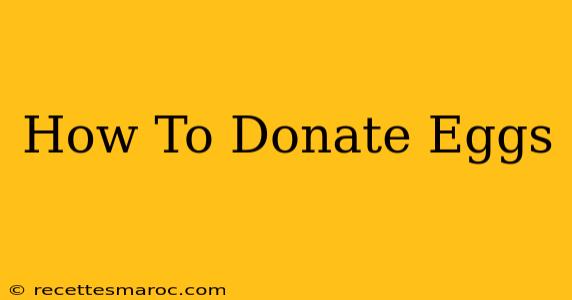Becoming an egg donor is a deeply selfless act that can bring immense joy to infertile couples and individuals. If you're considering egg donation, understanding the process is crucial. This comprehensive guide will walk you through everything you need to know, from eligibility requirements to the donation process itself.
Understanding Egg Donation
Egg donation, also known as oocyte donation, involves retrieving eggs from a healthy woman (the donor) and using them to help another person or couple conceive a child through assisted reproductive technology (ART) like in-vitro fertilization (IVF). The process is carefully regulated to ensure both the donor's and recipient's well-being.
Why Donate Eggs?
Many women choose to donate eggs for altruistic reasons – the desire to help others build families. However, there are also financial incentives involved, which vary depending on the clinic and location. It's vital to understand both the emotional and financial aspects before proceeding.
Eligibility Requirements for Egg Donation
Becoming an egg donor isn't automatic. Clinics have strict eligibility criteria designed to protect both the donor and the intended parents. These typically include:
- Age: Most clinics prefer donors between the ages of 21 and 30.
- Health: Donors must be in excellent physical and mental health. A thorough medical history review and physical examination, including blood tests and screenings for infectious diseases, are mandatory.
- Reproductive History: A history of regular menstrual cycles and successful pregnancies (if applicable) is usually required.
- Psychological Evaluation: Many clinics require a psychological evaluation to ensure the donor understands the emotional implications of egg donation.
- Fertility Testing: Testing to evaluate egg reserve and overall reproductive health is standard practice.
The Egg Donation Process: A Step-by-Step Guide
The egg donation process involves several key steps:
-
Initial Consultation: This involves discussing your medical history, motivations, and expectations with a fertility specialist. They will answer your questions and determine your eligibility.
-
Testing and Screening: A series of tests and screenings will be performed to assess your overall health and reproductive capabilities.
-
Medication: Once approved, you'll begin taking fertility medications to stimulate egg production. This involves daily injections administered at home, usually under the guidance of the clinic's medical staff.
-
Egg Retrieval: Once your follicles are mature, a minor surgical procedure called egg retrieval is performed. This is usually done under sedation and involves using a needle to retrieve the eggs from your ovaries.
-
Recovery: After the retrieval, you'll need some time to recover. Most donors experience minimal discomfort and can resume normal activities within a few days.
-
Post-Donation Care: You'll have follow-up appointments to monitor your health and ensure a complete recovery.
The Emotional Aspects of Egg Donation
Egg donation is an emotionally significant experience. It's essential to consider the potential emotional impact, both positive and negative, before proceeding. Many donors find the experience deeply rewarding, while others may experience emotional challenges. It's crucial to have strong support systems in place.
Finding an Egg Donation Program
Choosing the right egg donation program is vital. Research different clinics, understand their success rates, and ensure they have a strong reputation. Don't hesitate to ask questions and seek clarification on any aspect of the process.
Frequently Asked Questions (FAQ)
Q: Is egg donation painful?
A: The egg retrieval procedure is typically performed under sedation and causes minimal discomfort. Most donors report mild cramping afterward.
Q: How much does egg donation pay?
A: Compensation varies widely based on clinic location and individual circumstances.
Q: Can I remain anonymous?
A: Anonymity policies vary depending on the clinic and the laws in your jurisdiction. Some programs allow for open or semi-open donation where you can have some contact with the recipients, while others maintain complete anonymity.
Q: What are the risks involved?
A: While generally safe, there are potential risks associated with egg donation, such as ovarian hyperstimulation syndrome (OHSS), which can be managed with appropriate medical care.
Egg donation is a significant decision that requires careful consideration. This guide provides a foundation for understanding the process. Always consult with a fertility specialist to discuss your individual circumstances and eligibility. The journey of becoming an egg donor can be both challenging and deeply fulfilling. Remember to prioritize your own well-being throughout the process.

